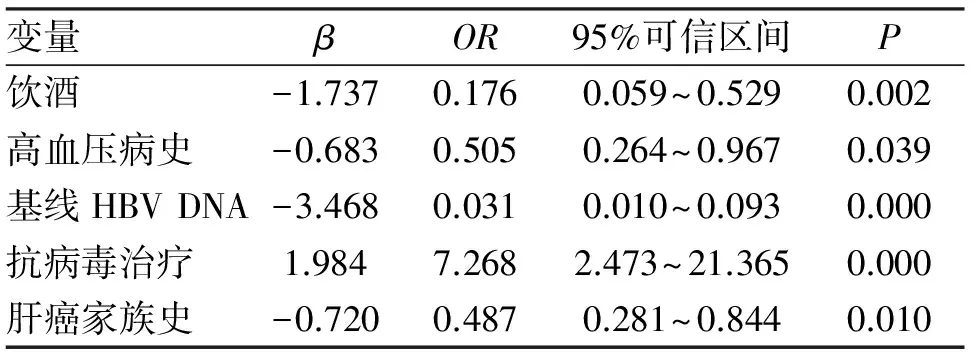无肝硬化乙肝患者肝癌发病影响因素分析
2017-06-22蒋雪花
魏 燕,杨 阳,王 赭,陈 坚,蒋雪花,陈 勇,杨 龙
无肝硬化乙肝患者肝癌发病影响因素分析
魏 燕1,杨 阳2,王 赭3,陈 坚1,蒋雪花2,陈 勇3,杨 龙2
目的 探讨无肝硬化乙肝相关肝癌患者的发病因素。方法 收集2004-01至2015-12月我院就诊的原发性肝癌共1000例。根据是否有肝硬化分为肝硬化组(n=934例)及无肝硬化组(n=66例),回顾性分析2组患者的一般情况及实验室检查指标等资料,对无肝硬化乙肝相关肝癌患者的发病因素进行χ2检验及Logistic回归分析。结果 单因素分析表明2组患者在年龄、是否饮酒、是否重叠丙型肝炎病毒感染、是否合并高血压、基线血清e抗原状态及血清HBV DNA水平、是否行抗病毒治疗与是否有肝癌家族史方面差异有统计学意义(P<0.05);将其纳入多因素非条件Logistic回归分析,结果提示饮酒(OR=0.176,P=0.002)、有高血压病史(OR=0.505,P=0.039)、基线血清HBV DNA水平偏低(OR=0.031,P<0.001)、既往未行抗病毒治疗(OR=7.268,P<0.001)、有肝癌家族史(OR=0.487,P=0.010)是无肝硬化慢性乙型肝炎患者直接进展为原发性肝癌的独立危险因素。结论 对于有饮酒史、有高血压病史、基线血清HBV DNA水平偏低、既往未行抗病毒治疗及有肝癌家族史的无肝硬化慢性乙型肝炎患者,应密切监测肝癌的发生。
乙型肝炎;肝癌;肝硬化;影响因素
对于大部分乙肝相关肝癌患者,其发病一般都会经历慢性乙型肝炎、肝硬化及原发性肝癌的漫长演变过程,然而有少部分慢性乙型肝炎患者,当确诊原发性肝癌时尚未出现肝硬化[1,2]。有研究认为,这可能与合并丙型肝炎病毒感染及饮酒有关[3,4]。但目前尚存在许多争议,其重要影响因素及发病机制尚未完全阐明。本研究回顾性分析了我院近年来1000例乙肝相关肝癌患者相关临床数据,旨在为进一步探讨无肝硬化慢性乙型肝炎患者进展为原发性肝癌危险因素提供更多的循证医学证据。
1 对象与方法
1.1 对象 收集2004-01至2015-12我院肿瘤内科、感染科及普通外科门诊及病房就诊的患者作为研究对象。原发性肝癌的诊断符合我国抗癌协会肝癌专业委员会2011年版肝癌诊疗规范[5];慢性乙型肝炎的诊断符合慢性乙型肝炎防治指南(2015年更新版)[6];排除继发性肝癌、合并自身免疫性肝病、胆汁淤积性肝硬化及人类免疫缺陷病毒(human immuno deficiency virus,HIV)感染;经手术治疗患者通过病理组织诊断是否肝硬化,无病理患者通过影像学、B超及生化检查综合判断。
1.2 观察指标 采用回顾性的方法,指定2名主治医师负责收集患者性别、年龄、吸烟及饮酒史,是否重叠丙型肝炎病毒感染,是否合并高血压及糖尿病等基础疾病,基线乙肝血清标志物及基线血清HBV DNA水平,抗病毒治疗史及肝癌家族史等资料。
1.3 实验室检查 血清HBV DNA检测采用实时荧光定量聚合酶链式反应法检测,仪器采用美国ABI公司ABI7300型PCR仪,检测最低检测值为300 copies/ml;乙肝标志物等免疫学指标采用ELISA法进行检测;生化指标采用美国雅培公司全自动生化分析仪检测。
1.4 影像学检查 上腹部超声采用美国飞利浦iU22彩色超声诊断系统;肝脏及门脉系统CT采用德国西门子公司Syngo 64排螺旋CT;肝脏MRI采用德国西门子公司MAGNETOM Skyra 3.0T智能磁共振成像系统。
1.5 统计学处理 采用SPSS 17.0统计软件进行分析,分类变量比较采用χ2检验及Logistic回归分析相关危险因素,以P<0.05为差异有统计学意义。
2 结 果
2.1 一般资料 共纳入1000例,男926例,女74例;年龄35~73岁,中位年龄44.6岁;根据是否有肝硬化分为肝硬化组934例及无肝硬化组66例。
2.2 单因素分析结果 肝硬化组与无肝硬化组在性别、吸烟情况及是否合并糖尿病方面差异无统计学意义(P>0.05),但在年龄、是否饮酒、是否重叠丙型肝炎病毒感染、是否合并高血压、基线血清e抗原状态及血清HBV DNA水平、是否行抗病毒治疗、有否有肝癌家族史方面差异有统计学意义(P<0.05,表1)。

表1 两组乙肝肝癌患者一般资料比较 (n;%)
2.3 多因素非条件Logistic回归分析 将单因素分析结果有统计学差异的自变量进行多因素非条件Logistic回归分析,结果提示饮酒、有高血压病史、基线血清HBV DNA水平偏低、既往未行抗病毒治疗、有肝癌家族史是无肝硬化患者直接进展为原发性肝癌的独立危险因素(表2)。

表2 非肝硬化乙肝肝癌组非条件性多因素Logistic回归分析
3 讨 论
美国肝病学会发布指南[7]指出:对于无肝硬化的慢性乙型肝炎患者,密切监测的范围包括大于40岁以上亚洲男性、大于50岁以上亚洲女性,以及非洲裔人群。但由于这个推荐的建议基于的循证医学证据有限,因此被认为不能代表美国无肝硬化慢性乙型肝炎患者并发原发性肝癌实际的比率和相关危险因素[8,9]。本研究发现,饮酒史、高血压病史、基线HBV DNA水平偏低、既往未行抗病毒治疗、有肝癌家族史是无肝硬化慢性乙型肝炎患者直接进展为原发性肝癌的独立危险因素。
据世界卫生组织报道,饮酒引起的死亡病例中肝脏疾病占70%[10]。饮酒可以增加乙肝肝硬化患者并发原发性肝癌的概率已经得到了普遍的共识[11-13],有高血压病史的无肝硬化慢性乙型肝炎患者较有肝硬化的慢性乙型肝炎患者并发原发性肝癌的概率高,目前机制尚不明确,但国内已有相关研究提示合并高血压的乙肝肝硬化患者更易于并发肝癌,提示高血压对原发性肝癌的发生有促进作用[14]。
既往研究表明,血清病毒载量越高,慢性乙型肝炎患者进展为肝癌的风险越大[15],但本研究结果提示基线血清HBV DNA偏低的慢性乙型肝炎患者较病毒高的患者更容易直接进展为肝癌。近年来有研究报道,经恩替卡韦抗病毒治疗的慢性乙型肝炎患者中,诊断乙肝相关肝癌时有高达44.6%的患者无肝硬化[16],虽发生机制未明,但同时也提示临床医师对于血清HBV DNA不高的无肝硬化慢性乙型肝炎仍应保持高度警惕,密切监测病情以免漏诊。肝癌的发生存在家族聚集性已经得到相关研究的证实。文献[1]发现,在无肝硬化的乙肝相关肝癌患者中,有肝癌家族史的患者相比较于有肝硬化的乙肝相关肝癌患者显著增多,与本研究结果一致。
综上所述,本研究发现,对于无肝硬化的慢性乙肝患者,仍不能放松对肝癌发生的监测,特别是有饮酒史、高血压病史、基线HBV DNA水平偏低、既往未行抗病毒治疗及有肝癌家族史的患者,应作为重点监测对象。笔者建议,可适当增加患者腹部B超或MRI的检查频次,以免出现漏诊造成不良后果。但本研究也存在一些不足之处:(1)纳入的1000例肝癌患者中仅66例无肝硬化,且男女比例相差较大,可能导致检验效能偏低;(2)因本研究是回顾性分析,失访患者较多,未能进一步研究两组患者的生存状况;(3)因获得患者的病理资料较少,在诊断是否有肝硬化时多依靠影像学检查,可能会出现诊断偏差。因此,下一步拟开展前瞻性研究,严格筛选纳入病例标准,密切随访,对无肝硬化的慢性乙型肝炎患者直接进展为肝癌的影响因素做出更加精准的判断,为临床工作提供更多的循证医学证据。
[1] Chayanupatkul M, Omino R, Mittal S,etal. Hepatocellular carcinoma in the absence of cirrhosis in patients with chronic hepatitis B virus infection[J]. J Hepatol, 2017,66(2):355-362.
[2] Mittal S, El-Serag H B, Sada Y H,etal. Hepatocellular Carcinoma in the Absence of Cirrhosis in United States Veterans is Associated With Nonalcoholic Fatty Liver Disease[J]. Clin Gastroenterol Hepatol, 2016, 14(1): 124-131.
[3] Albeldawi M, Soliman M, Lopez R,etal. Hepatitis C virus-associated primary hepatocellular carcinoma in non-cirrhotic patients[J]. Dig Dis Sci, 2012, 57(12): 3265-3270.
[4] Grazi G L, Cescon M, Ravaioli M,etal. Liver resection for hepatocellular carcinoma in cirrhotics and noncirrhotics. Evaluation of clinicopathologic features and comparison of risk factors for long-term survival and tumour recurrence in a single centre[J]. Aliment Pharmacol Ther, 2003, 17(Suppl 2): 119-129.
[5] 中华人民共和国卫生部. 原发性肝癌诊疗规范(2011年版)[J].临床肿瘤学杂志,2011,16(10):929-946.
[6] 中华医学会肝病学分会,中华医学会感染病学分会. 慢性乙型肝炎防治指南(2015年更新版)[J]. 临床肝胆病杂志,2015,31(12):1941-1960.
[7] Bruix J,Sherman M. Management of hepatocellular carcinoma: an update[J].Hepatology,2011,53(3):1020-1022.
[8] Do A L, Wong C R, Nguyen L H,etal. Hepatocellular carcinoma incidence in noncirrhotic patients with chronic hepatitis B and patients with cirrhosis of all etiologies[J]. J Clin Gastroenterol, 2014, 48(7): 644-649.
[9] Kim J M, Kwon C H, Joh J W,etal. Differences between hepatocellular carcinoma and hepatitis B virus infection in patients with and without cirrhosis[J]. Ann Surg Oncol, 2014, 21(2): 458-465.
[10] Sheron N,Hawkey C,Gilmore I. Projections of alcohol deaths-a wake-up call[J]. Lancet, 2011, 377(9774): 1297-1299.
[11] Testino G,Leone S,Borro P. Alcohol and hepatocellular carcinoma: a review and a point of view[J].World J Gastroenterol, 2014, 20(43):15943-15954.
[12] Lin C W,Lin C C,Mo L R,etal.Heavy alcohol consumption increases the incidence of hepatocellular carcinoma in hepatitis B virus-related cirrhosis[J]. J Hepatol, 2013, 58(4): 730-735.
[13] 李佳红,付 娜,牛学敏,等. 573例原发性肝癌病因及临床特点分析[J].实用肝脏病杂志,2015, 18(4):399-402.
[14] 郭秀平. 高血压病与乙肝肝硬化及肝癌的关系探讨[J]. 中西医结合心脑血管杂志,2012, 10(12):1522-1523.
[15] Chen C J,Yang H I. Natural history of chronic hepatitis B REVEALed[J]. J Gastroenterol Hepatol, 2011, 26(4): 628-638.
[16] Wong G L, Chan H L, Chan H Y,etal. Accuracy of risk scores for patients with chronic hepatitis B receiving entecavir treatment[J]. Gastroenterology, 2013,144(5):933-944.
(2016-11-14收稿 2017-02-21修回)
(责任编辑 郭 青)
Influencing factors of hepatitis B virus related hepatocellular carcinoma patients without cirrhosis
WEI Yan1,YANG Yang2,WANG Zhe3,CHEN Jian1,JIANG Xuehua2,CHEN Yong3,and YANG Long2.
1.Department of Oncology, 2. Department of Infectious Diseases, 3. Department of General Surgery, Shanghai Municipal Corps Hospital of Chinese People's Armed Police Force, Shanghai 201103, China
Objective To investigate the risk factors of hepatitis B virus related hepatocellular carcinoma patients without cirrhosis.Methods A total of one thousand hepatocellular carcinoma patients were collected between January 2004 and December 2015-at Shanghai Corps Hospital of Chinese People’s Armed Police Force. The patients were divided into cirrhosis(n=934) group and non-cirrhosis(n=66) group according to whether there was cirrhosis of the liver. The general information and indexes of laboratory examination in both groups were analyzed retrospectively.χ2test and Logistic regression analysis were performed on the risk factors of hepatitis B virus related hepatocellular carcinoma patients without cirrhosis.Results The univariate analysis indicated that the difference in age, drinking of alcohol, overlap of hepatitis C virus infection, combination with hypertension, baseline serum e antigen status and serum HBV DNA levels, previous antiviral therapy and the family history of liver cancer were statistically significant between the two groups(P<0.05). The multivariate non-conditioned Logistic regression analysis of these eight factors indicated that drinking of alcohol(OR=0.176,P=0.002), combination with hypertension(OR=0.505,P=0.039), lower baseline serum HBV DNA levels (OR=0.031,P<0.001), previous antiviral therapy (OR=7.268,P<0.001) and the family history of liver cancer(OR=0.487,P=0.010) were independent risk factors which induce chronic hepatitis B to directly develop into hepatocellular carcinoma without cirrhosis.Conclusions Drinking of alcohol, combination with hypertension, low baseline serum HBV DNA levels, no previous antiviral therapy and the family history of liver cancer patients are possibly associated with the occurrence of hepatocellular carcinoma.
hepatitis B; hepatocellular carcinoma; cirrhosis; influence factor
魏 燕,本科学历,主治医师。
201103,武警上海总队医院:1.肿瘤内科,2.感染科,3.普通外科
杨 龙,E-mail:yyandcg@sina.com
R735.7
